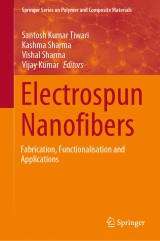Details

Electrospun Nanofibers
Fabrication, Functionalisation and ApplicationsSpringer Series on Polymer and Composite Materials
|
CHF 118.00 |
|
| Verlag: | Springer |
| Format: | |
| Veröffentl.: | 14.09.2021 |
| ISBN/EAN: | 9783030799793 |
| Sprache: | englisch |
Dieses eBook enthält ein Wasserzeichen.
Beschreibungen
<p>The book provides an up-to-date account of the various techniques of fabrication & functionalization of electrospun nanofibers as well as recent advancements. An overview of the advanced applications of such techniques in different areas is also presented. Both experimental and theoretical approaches related to electrospun nanofibers are covered along with a discussion on the inherent properties of electrospun nanofibers. Therefore, this book provides a unique resource not only to established researchers but also newcomers starting out in this field.</p>
Production and application of biodegradable nanofibers using electrospinning techniques.- Electrospun nanofibers for energy and environment applications.- Polymer nanofibers via electrospinning for flexible devices.- Dimension controlled polymeric nanofibers via electrospinning.- Electrospun nanofibers for waste water treatment.- Electrospun nanofibers for coating and corrosion protection.- Polymer nanofibrous and their application for batteries.- Polymeric nanofibers via electrospinning for drug delivery.- 1-D and 3-D Spinel architectures via electrospinning for supercapacitors.- Polymer and ceramics based hollow nanofibers via electrospinning.
<div><p>Dr. Santosh K. Tiwari received his Ph.D. from IIT Dhanbad, India in Graphene-based Polymer nanocomposites and then worked with HSCL, Hanyang University, Seoul, South Korea for 1.5 years. In 2019 he joined the University of Guangxi, Nanning, China as a tenured faculty and then moved to Poland where he got a prestigious NAWA research grant from Govt. of Poland and presently working as a scientist in Department of Chemistry, University of Warsaw. In addition, Dr. Tiwari is a visiting faculty in the Department of Chemical Science & Engineering, Kathmandu University, Nepal. He has published more than 45 research and has edited four books.</p><p></p>Dr. Kashma Sharma has received her Ph.D. from Shoolini University of Biotechnology and Management Sciences, Solan (H.P.) in Collaboration with the National Institute of Technology (NIT) Jalandhar. In September 2014, she joined the material science group at the University of the Free State, South Africa as a postdoctoral research fellow. She was awarded UGC Post-Doctoral Fellowship to Women in 2017 and carried out the research work in the Institute of Forensic Science & Criminology, Panjab University Chandigarh. She started her independent academic career as an Assistant Professor in the Department of Chemistry, DAV College, Chandigarh at the end of April 2021. Her research experience, as well as research interests, lies in the following fields: synthesis, processing, and characterization of bio-based/biodegradable polymers and composite; drug delivery devices, tissue engineering, wastewater treatment, polymer nanocomposites, and ion solid interaction. She also worked in Grant-in-aid for the joint center project titled "Joint Center for generating tissue-engineered organs and controlling cell behavior" under Indo-US Joint R&D Networked Center. So far, she has been published more than 25 research papers, and has edited 3 books and published 5 book chapters.<p></p><p></p>Dr. Vishal Sharma is presently working as AssistantProfessor at Institute of Forensic Science & Criminology (IFSC), Faculty of Science, Panjab University, Chandigarh (INDIA). He is currently heading the Institute at Panjab University. He has obtained his Ph.D. degree in Physics from Kurukshetra University, Kurukshetra, India and Inter University Accelerator Centre (IUAC-an autonomous centre of UGC, Govt. of India), New Delhi (INDIA). He is the recipient of DAE Young scientist research award in 2011. He is leading research groups (Material research and Forensic research) at Panjab University, Chandigarh and having over 17 years of teaching and research experience. His current research interest is in the field of Material Science (synthesis of smart materials for different applications, nanophosphors, Hydrogels), Sensors (drug sensing, fingermark sensing), Molecular Spectroscopy, Forensic Chemistry, Analytical Chemistry, Chemometrics. He has published 90 peer-reviewed scientific papers, six book chapters and three books.<p></p><p></p>Dr. Vijay Kumar is presently working as Assistant Professor, Department of Physics, National Institute of Technology Srinagar (J&K), India. He received his Ph.D. in Physics at the beginning of 2013 from the SLIET Longowal. From 2013 to 2015, he was a postdoctoral research fellow in the Phosphor Research Group, Department of Physics, University of the Free State, South Africa. He has received the Young Scientist Award under the fast track scheme of the Department of Science and Technology (Ministry of<p></p><p>Science and Technology, Government of India), New Delhi. He also worked in Grant-in-aid for the joint center project titled "Joint Center for generating tissue-engineered organs and controlling cell behavior" under Indo-US Joint R&D Networked Center. He has been a nominated member of the Scientific Advisory Committee for Initiative for Research and Innovation in Science (IRIS) by DST. He has also received the “Teacher with Best Research Contribution Award” by Hon'ble Chancellor, Chandigarh University on Teachers Day. He is currently engaged in the research of functional materials, solid-state luminescent materials, ion beam analysis, biodegradable composites, smart polymers, and biomedical applications. He has published more than 70 research papers, 10 peer-reviewed conference proceedings, 6 book chapters, and edited 4 books (authored and co-authored).</p></div>
<p>The book provides an up-to-date account of the various techniques of fabrication & functionalization of electrospun nanofibers as well as recent advancements. An overview of the advanced applications of such techniques in different areas is also presented. Both experimental and theoretical approaches related to electrospun nanofibers are covered along with a discussion on the inherent properties of electrospun nanofibers. Therefore, this book provides a unique resource not only to established researchers but also newcomers starting out in this field.</p>
Overview of recent advances in electrospun nanofibers Presents applications of electrospun nanofibers Useful reference for new researchers
Diese Produkte könnten Sie auch interessieren:

Introduction to Focused Ion Beams

von: Lucille A. Giannuzzi, Lucille A. North Carolina State University

CHF 153.50















